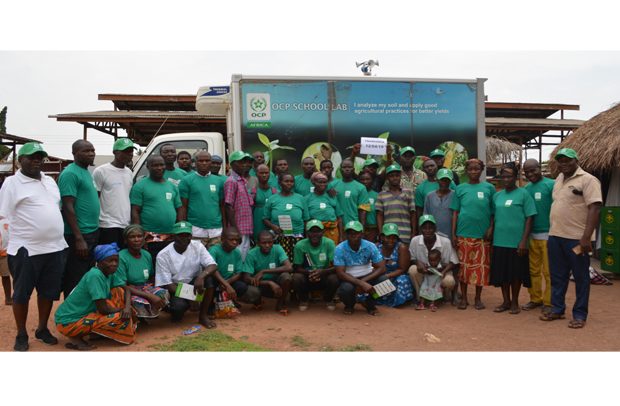Some of the beneficiary farmers at Frankadua
OCP Ghana has scaled up its school lab project, targeting to support some 50,000 farmers in four regions, this year.
The OCP school lab project, which has been hailed by farmers, involves educating farmers on best agronomic practices, and soil testing to inform farmers of the fertility level of their farmlands.
Through the testing, farmers are given the opportunity to effectively determine what crop to cultivate and which fertilizer to use to enhance crop yield.
The project, rolled out in collaboration with the Ministry of Food and Agriculture, is playing a key role in the quest to transform agriculture production in the country.
Launched in 2017, the school lab project is in line with the corporate social responsibility programme of OCP Ghana, a subsidiary of OCP Africa in Morocco, the largest fertilizer producer in Africa.
The four regions, consisting the Eastern, Ashanti, Upper West and Upper East regions, will add to the Northern and Brong Ahafo regions which were covered last year.
Eric Nesta Quarshie, Business Development Manager at OCP Ghana, in an interview during the project team’s soil testing and education exercise at Frankadua in the Eastern Region, said the prime aim of the project was to support farmers to achieve improved yields which would go a long way to enhance the economy.
He said with the soil being the most vital factor in farming, there is the need for farmers to be informed about the soil fertility and the nutrients level for the right action to be taken.
Two mobile school labs, he said, were in operation at the moment, adding that the patronage by the farmers had been very high, with many farmers eager to have their soils tested and learn best agronomic practices.
Currently, he said the mobile school labs are covering the Eastern Region, during which 2,100 soil samples from farmers would be tested, while 8,400 farmers would be educated on best agronomic practices.
So far, four districts in the Eastern Region have been covered. They are Upper Manya, Lower Manya, Yilo Krobo and Asuogyaman districts.
At the end of the soil testing outreach on Friday at Frankadua, the last of 10 towns covered in the Asuogyaman district, the farmers hailed the project, describing it as a timely intervention.
According to them, the test results would help them to save cost by purchasing the right fertilizers for a meaningful effect, and be able to engage in best farming practices that ensure high yields.
Bright Amenorhu, Assemblyman for Frankadua-Morgadzi, expressed optimism that the knowledge gained from the farming school lab would help to save them from the dwindling crop yield in the area.
Felix Mensah, Asuogyaman District Crop Officer, noted that the results of the soil tests show a general depletion of soil nutrients, indicating that “nitrogen is very low.”
“With these results we, the farmers, now know what to do regarding what crops to plant, which fertilizers to use, how to apply fertilizer, and how to manage their farms for high yields,” he stressed.


